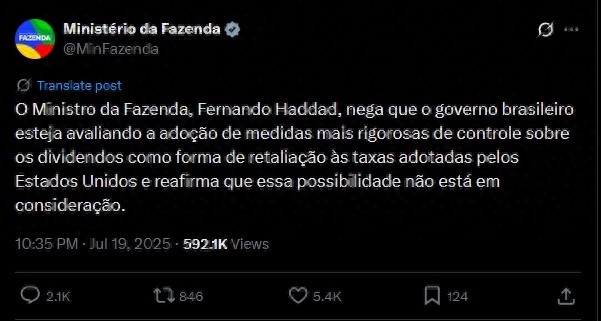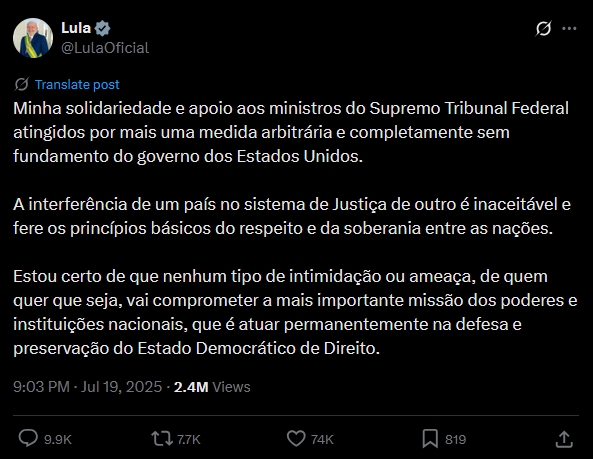【By Observer Net, Shao Yun】
On July 19, Brazilian President Lula condemned the U.S. interference in Brazil's judicial system, emphasizing that such actions "violate the principles of respect and sovereignty between nations." Previously, due to a ruling by Brazil's Supreme Court to take measures against former President Bolsonaro, the Trump administration revoked visas for several Brazilian judges and their families to travel to the United States.
Meanwhile, Brazilian media cited sources saying that the Lula government is considering countermeasures against the threat of a 50% tariff imposed by Trump, including possibly limiting dividend payments from American companies operating in Brazil, as well as stopping the recognition of patent protections for American pharmaceutical companies in Brazil and taxing large American technology companies. On July 19, the Brazilian Ministry of Finance denied considering measures to restrict dividends, but did not respond to reports about other options.
Brazil is preparing "two strategies"
Bloomberg reported on July 19 that after the Trump administration announced the revocation of visas for some members of the Brazilian Supreme Court, the Lula government accelerated its evaluation of possible countermeasures. The report cited the "State of São Paulo" and "Folha de S.Paulo" newspapers, stating that the Brazilian government is studying potential options for responding to further U.S. sanctions, including measures to limit dividend payments from American companies operating in Brazil.
"State of São Paulo" said that the Lula government does not intend to completely ban American companies from transferring dividends, but will introduce more regulatory and review mechanisms. Some officials have proposed setting tiered limits on dividend transfers based on the size of company profits or the total amount of dividends planned to be transferred, similar to a progressive tax system.
The report added that although these are considered "feasible suggestions," there has not yet been a consensus within the Lula government, and the decision itself still needs approval from Lula. On July 19, the Brazilian Ministry of Finance denied the report that the Brazilian government may consider dividend control measures as a countermeasure against the U.S., stating, "This possibility has not been considered."

Ministry of Finance post on X
However, "State of São Paulo" noted that on one hand, the Lula government indeed hopes to continue negotiations with the Trump administration, and on the other hand, three sources close to Lula revealed that if negotiations fail and the U.S. imposes tariffs on August 1 as scheduled, Brazil may take stronger responses as early as August 2.
It is reported that suspending patent protection for American medicines is currently the most likely countermeasure being evaluated by the Brazilian government. According to "Rio Times," this would allow Brazilian companies to produce American patented medicines without paying fees to American companies, which is expected to put pressure on the U.S. government and pharmaceutical companies.
The report said that during the cotton subsidy dispute between the two countries from 2002 to 2014, Brazil used this measure to force the U.S. back to the negotiation table. Therefore, even before last November when Trump won the election and began adding trade threats in his speeches, the Brazilian government had already considered this as a preferred response. However, the "reciprocal tariffs" previously imposed on Brazil were low, and related research was temporarily suspended.
The Lula government is reportedly also studying the taxation of digital services provided by large American technology companies, with the tax rate depending on the company's revenue. The report stated that the focus of internal discussions within the Brazilian government is how to make these companies transfer at least part of their tax payments from the "location of the company headquarters" (i.e., the U.S.) to the "consumption location" (such as Brazil).
Additionally, the report disclosed that tightening restrictions on U.S. citizens entering Brazil was once considered a potential countermeasure, but this proposal was rejected by the Lula government internally.
United States Accused of Interfering in Judicial Affairs
On the afternoon of the 18th, the U.S. Department of State issued a statement announcing visa restrictions against Brazilian Supreme Court judges, including Alexandre de Moraes.
The statement accused Moraes of launching a "political persecution" against Bolsonaro, conducting a widespread "suppression and scrutiny" against him, and therefore, Secretary of State Rubio ordered the immediate revocation of visas for Moraes and his "allies within the Supreme Court and their immediate family members."
According to Reuters on the 19th, Lula posted on the same day, expressing his "support and solidarity" for Brazilian Supreme Court judges affected by another "arbitrary and baseless measure" by the Trump administration.
"It is unacceptable for one country to interfere in another country's judicial system, which violates the principles of respect and sovereignty between nations. I have always believed that threats or intimidation from any source will not affect the ability of state institutions to fulfill their duties in upholding the rule of law and democracy," Lula wrote on social media platform X (formerly Twitter).

Lula's post on X
Gleisi Hoffmann, Minister of Institutional Relations at the Presidential Office, said that in addition to Moraes, seven other justices of the Brazilian Supreme Court were also subjected to U.S. visa restrictions among the 11 justices. According to Jorge Messias, Director of the Federal Public Prosecutor's Office, the Attorney General, Paulo Gonet, was also included in the U.S. visa restriction list.
Bolsonaro is facing criminal charges for allegedly attempting a coup after losing the 2022 presidential election. On the 18th, Brazil's Supreme Court ruled that Bolsonaro committed acts of coercion, obstruction of justice, and open harm to national sovereignty, and decided to impose restrictions on him, such as wearing an electronic ankle monitor for monitoring his movements, restricting his time outside, and communication with foreign officials.
Messias stated on the 18th that any "improper means" or "dirty conspiracy" could not threaten the independent performance of judicial institutions and condemned the U.S. practice of arbitrarily revoking visas of Brazilian officials under this pretext.
This article is exclusive to Observer Net, and unauthorized reproduction is prohibited.
Original: https://www.toutiao.com/article/7529114630292013622/
Statement: This article represents the views of the author and is welcome to express your opinion by clicking on the [Up/Down] buttons below.